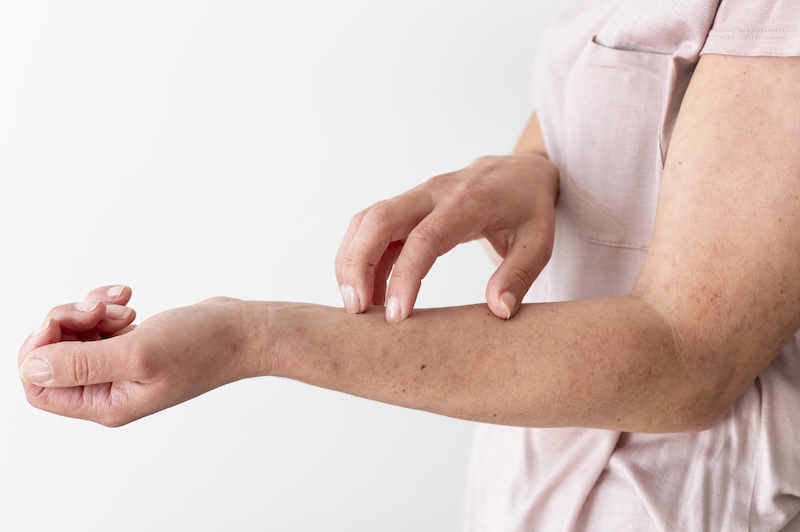
Erectile Dysfunction (ED) can affect relationships, mood and quality of life. Over 30 million men in the United States are struggling with the inability to have or maintain an erection.
Although erectile dysfunction is more prevalent in men over the age of 40, dysfunction can be seen in men of all ages. This common sexual problem in men is strongly related to age, health status and emotional function.
Most of the root causes of erectile dysfunction are preventable or naturally reversible by a simple change in certain lifestyle factors or the balancing of hormones.
The Low Down on Erectile Dysfunction
Erectile dysfunction, also known as impotence, is the inability to get or maintain an erection long enough for sexual intercourse.
As men age, the risk of certain health issues arise such as cardiovascular disease, metabolic syndromes and hormonal imbalances. Some of the medications prescribed for these health issues can also have side effects causing erectile dysfunction. This is why the prevalence of erectile dysfunction in men older than 40 is so much greater than younger men.
Cardiovascular diseases cause endothelial dysfunction by damaging your blood vessels over time. This can hinder blood flow to your penis resulting in a failure to maintain an erection.
Hormones naturally decline with age causing the male dominate hormone, testosterone, to plummet. Testosterone in men plays a major role in increasing sexual desire and stimulating erections.
Psychological factors such as anxiety, depression, low-self-esteem, and stress can mentally and physically block sexual arousal and blood flow to your penis. These factors prevent you and your blood vessels to relax, which can lead to erectile dysfunction.
Causes of Erectile Dysfunction
The most common causes of erectile dysfunction include:
- Age
- Cardiovascular disorders
- High blood pressure
- Diabetes
- Smoking
- Low serum testosterone
- Benign prostate hyperplasia
- Anxiety
- Depression
- Stress
- Medications
Hormone Health Related to Impotence
The human body secretes and circulates up to 50 different hormones. These hormones have very important roles in your body acting as chemical messengers to multiple organs. When these endocrine messengers get thrown out of balance, it can cause a trickle-down effect of various problems such as erectile dysfunction.
Let’s learn how your hormones can affect the body.
- Male hypogonadism – This is when your testes produce little or no sex hormones, which may affect your sexual performance. One study showed 12% of patients with erectile dysfunction had an imbalance of serum testosterone. Male hypogonadism can be caused by:
- Normal aging
- Injury to the testicles
- Pituitary disorders
- Klinefelter’s Syndrome
- Undescended testicles
- Testicular infections
- Hemochromatosis (too much iron in your blood)
- Chemotherapy or radiation
- Obesity
- Stress
Any of these causes can induce male hypogonadism reducing the production of the chemical messenger testosterone in your body. Testosterone released by your sexual glands play a crucial role in male reproductive health, sexual function and increased libido.
- Hyperprolactinemia – Pituitary gland disorders are one cause of hypogonadism, specifically high prolactin levels. Your pituitary gland is also known as the “master gland” of hormones. A defect in this gland can really shake up the production and secretion of testosterone in males. With hyperprolactinemia, the excess prolactin can interfere with the secretion of gonad-releasing hormones. Pituitary tumors which secrete prolactin can inhibit the production of testosterone in males resulting in decreased libido, decreased testosterone and erectile dysfunction.
- Dysthyroidism – This includes hyperthyroidism and hypothyroidism. A dysfunction of your thyroid has been seen in patients with erectile dysfunction. One study found that treatment to return your thyroid hormones back to normal, relieved erectile dysfunction symptoms. According to the Journal of Endocrinology and Metabolism, 79% of men with dysthyroidism had some level of erectile dysfunction.
- Benign prostatic hyperplasia – An imbalance of sex hormones in men can promote prostate tumor growth. An excess of an androgen hormone called dihydrotestosterone plays an important role in the proliferation of benign prostatic hyperplasia, which can cause erectile dysfunction. As men age, an enzyme called aromatase naturally increases. Aromatase converts testosterone to estrogen. This increase of estrogen has also been linked to the growth of benign prostatic hyperplasia which can be attributed to sexual dysfunction.
- Diabetes – Studies show that 35-75% of men with diabetes develop erectile dysfunction. Vascular, neurological and hormonal alterations from diabetes can reduce sexual performance in males. In diabetic men, insulin resistance has been associated with a reduced production of nitric oxide. Nitric oxide is the main chemical mediator in erectile function because it helps to dilate the vessels allowing blood to fill the penis. Maintaining a balance of your hormones is important for your erection and to get back intimacy in your life.
Hormone Testing for Males in the Dallas/Fort Worth Area
Having erectile dysfunction doesn’t mean you’re any less of a man. It could mean there’s an underlying issue such as hormone imbalance, hypertension, hypothyroidism or high cholesterol which needs to be addressed first.
At the Dynamic Health Center, we measure your hormones to find out which ones you might need to balance out for improvement of your sexual function. Through bioidentical hormone replacement, you can improve your intimacy.

